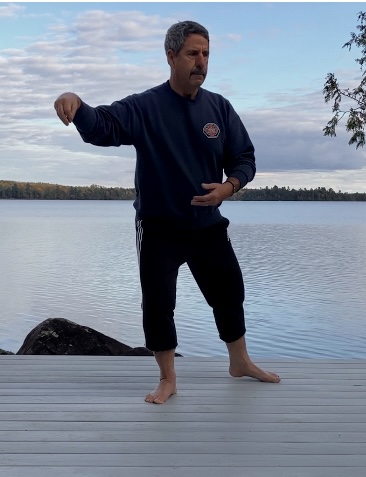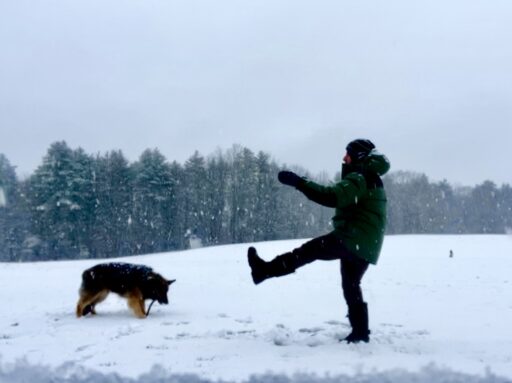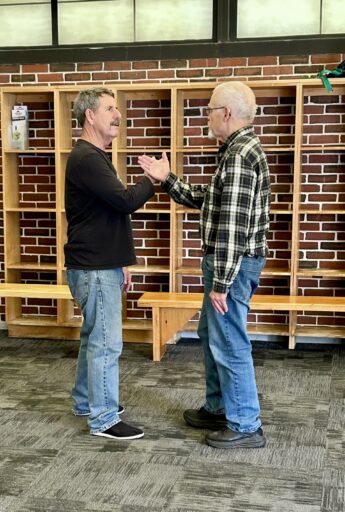As Veterans’ Day approaches, we pause to honor the bravery, sacrifice, and resilience of those who have served our country.
But this day is also a reminder of the ongoing struggles many veterans face once their service ends. For some, the return to civilian life brings physical injuries, emotional trauma, and isolation. In these challenging times, veterans like Rick Stoker are stepping forward to help others heal, not through traditional medicine, but through the ancient practice of Tai Chi.
Rick Stoker, a veteran himself and ATCQA-certified Tai Chi Instructor, has found a way to give back to his fellow veterans by teaching Tai Chi and Qigong, two practices that combine gentle movements, breath control, and mental focus to improve physical and mental well-being.
His classes, held at the Maine Veteran’s Administration and Veterans Adaptive Sports & Training (VAST), provide life-changing support to veterans suffering from trauma, PTSD, substance abuse, and other challenges.

(Rick Stoker doing Tai Chi lakeside)
A Journey Rooted in Martial Arts
Stoker’s journey in martial arts began long before his work with veterans. His martial arts experience spans decades, starting in 1997. He earned his 2nd degree black belt in Shorinji-Ryu Karate-do and was introduced to Yang style Taijiquan, which deeply resonated with him.
Reflecting on his teachers, Stoker is quick to credit his mentors for guiding him along this path. He highlights Hanshi Rod Sanford of Sanford Traditional Martial Arts, Sifu Mark Bernard of Santa Cruz Tai Chi, and Sifu Jason Ames, who co-teaches Tai Chi with Stoker at VA Whole Health Division in Maine, as critical influences. He also acknowledges the role of Kristina Sabasteanski, the founder of Veteran Adaptive Sport & Training (VAST), in providing him with the opportunity to teach veterans.
Stoker’s teaching draws from a rich lineage of Taijiquan masters. But it’s his unique ability to connect with his fellow veterans that sets him apart as a teacher.
The Healing Power of Tai Chi for Veterans
For many veterans, returning home is only the beginning of a new battle. The veterans in Stoker’s classes have experienced unimaginable hardships: traumatic brain injuries, amputations, chemical exposures, PTSD, and systemic injuries. Some have turned to isolation, alcohol, or drugs to cope. These are the people Stoker serves, offering not just a class, but a lifeline.
In his own words, Stoker describes being “overwhelmed” by the courage and optimism of his students. These men and women have fought in conflicts ranging from World War II to the Middle East, and their experiences often leave deep scars. But in Stoker’s Tai Chi and Qigong classes, something transformative happens. Veterans find more than just physical benefits—they find community.

(Rick Stoker doing Tai Chi in snow)
According to Stoker, the companionship that Tai Chi offers is one of the greatest gifts from the practice. He cites the Harvard Medical Guide to Tai Chi, which underscores how being part of a healthy community can be as valuable as the physical exercises themselves. This sentiment is echoed by his students, who report improvements in sleep, digestion, mental clarity, and social engagement. Some have even found that their cravings for drugs and alcohol lessen, and a few have sought treatment as a result.
The connection between veterans in Stoker’s class is palpable. It’s not just about learning a martial art; it’s about healing together. Veterans who once struggled to trust others now find themselves part of a supportive, understanding group. Stoker describes how veterans share their experiences before and after class, offering guidance and support rooted in their common backgrounds. These conversations, more than the movements themselves, create a powerful bond.
Veterans Helping Veterans

(Rick Stoker teaching Tai Chi to a fellow veteran)
One of the most profound aspects of Stoker’s work is his recognition that veterans need each other to heal. He tells a story that perfectly illustrates this point. It’s the tale of a man named Bob who falls into a deep hole and is unable to climb out. A priest and a doctor pass by, offering prayers and prescriptions, but neither truly helps. Then, Bob’s friend Bill comes along. Instead of offering advice from the sidelines, Bill jumps into the hole with Bob, explaining that he knows the way out because he’s been there before.
This story resonates with the veterans in Stoker’s class because it reflects their shared reality. Veterans often feel misunderstood or overlooked by those who haven’t experienced the trauma of war. But in Stoker’s Tai Chi classes, they find a teacher who not only understands their struggles but has walked the same path. Stoker isn’t just teaching Tai Chi; he’s offering a way out of the hole.
The sense of trust that develops in these classes is crucial. Veterans open up to one another, not just because they share similar experiences, but because they know they are in a safe space, provided by the Veterans Administration and VAST. Without these organizations, many veterans might never have discovered Tai Chi and Qigong. These programs have created fertile ground for healing, and Stoker’s classes are the blossoming lotus that has emerged.
The Path Forward
For Rick Stoker, teaching Tai Chi to veterans is not just about giving back, though that’s part of it. It’s about the shared experience of healing, of creating something stronger together than they could ever achieve alone. As Stoker puts it, “I need them.” The collective energy that builds in these classes, the way veterans support one another, and the transformations they undergo are nothing short of remarkable.
As we celebrate Veterans’ Day, we honor not only those who have served but also those like Rick Stoker, who continue to serve by helping others heal.
Tai Chi may be an ancient practice, but in the hands of a veteran like Stoker, it becomes a modern tool for recovery, connection, and hope. It’s a testament to the fact that, even after the battles have ended, veterans continue to fight for one another in the most profound ways.